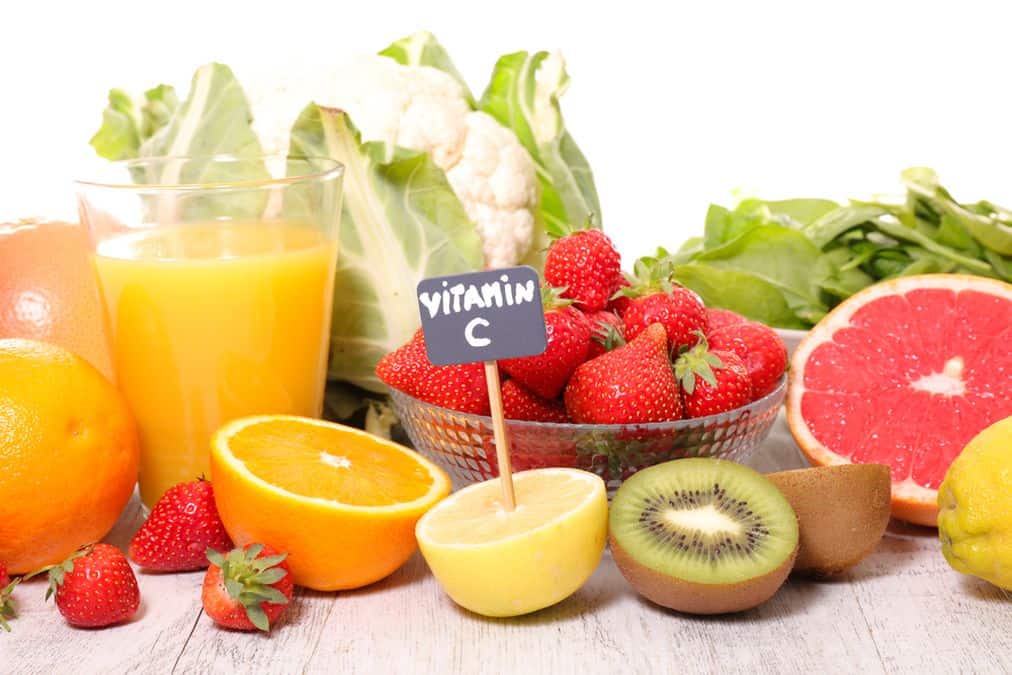
Vitamin C (ascorbic acid) – properties. What do we need it for?
In order to function properly, the human body needs large doses of various substances, mainly organic compounds, of which vitamins are undoubtedly the most important. Their name comes from the Latin word “vita”, life, so we should make sure that they are in our daily diet, and any possible deficiencies should be supplemented with appropriately selected dietary supplements. Vitamins that we need to provide are many, but one of the most important, which our body can not produce, is vitamin C, or l-ascorbic acid.
Contents
Vitamins – what they are and how we divide them
As I mentioned earlier, vitamins are organic compounds, essential for our health, conditioning the course of many important processes, especially metabolic ones. They are usually of natural origin, but they can also be obtained through synthesis of various chemical compounds. The human organism is not able to produce them, or produces too small quantities, therefore we call them exogenous, supplied from external sources. We divide them into two basic groups:
- fat-soluble, which include vitamin A, vitamin D, E and K;
- water-soluble, and in this group are vitamin B, folic acid and vitamin C.
Vitamins – effects of their deficiency and excess

If we care about preserving our health, vitamins from both groups must absolutely be provided every day. However, it is important that these are properly selected their doses, and both a deficiency of vitamins, including vitamin C, as well as an excess, can have serious consequences.
Vitamin deficiency, called avitaminosis, is a disease in the course of which the body begins to lack one or more vitamins. It is divided into primary, when we ourselves do not provide ourselves with the appropriate amount of vitamins, and secondary, when for various reasons the body is not able to absorb them properly. Avitaminosis manifests itself depending on the vitamin whose deficiency we currently feel, and the most common effects of vitamin C deficiency are:
- severe pain in bones, joints and muscles;
- bad mental mood, intensification of stress symptoms leading in extreme cases even to depression;
- a constant feeling of fatigue and weakness;
- Thyroid diseases, hypothyroidism;
- weakened immunity;
- inflammatory conditions, including mucous membranes;
- cardiovascular diseases, including atherosclerosis;
- scurvy;
- impaired healing of wounds;
- lack of appetite;
- an increase in the level of iron, which may become the cause of damage to many organs, the liver, kidneys, pancreas, and the centrifugal nervous system.
The opposite of avitaminosis is hypervitaminosis, a disease that develops under the influence of an excess of vitamins provided to the body. It can also occur in the case of ascorbic acid overdose, the negative effects of which include
- increased risk of kidney stones;
- disorders of the digestive system, nausea, vomiting and diarrhea;
- more frequent urination than usual;
- reduced effect of some medications;
- skin reactions, allergies in the form of a rash somewhat resembling acne.
Fortunately, cases of vitamin C overdose are extremely rare, which is facilitated by the fact that it is water-soluble, and its level of absorption in the body is as high as 70-80 percent.
Vitamin C – who discovered it and what is the recommended dosage

Vitamin C was first isolated in 1928 by a Hungarian biochemist Albert Szent-Györgyi, interestingly enough from the fruit of pepper and for this achievement he was awarded the Nobel Prize. In addition to medicine, it is also used in cosmetics, mainly entering the composition of creams and other preparations for skin care. Our body has a high demand for l-ascorbic acid, amounting respectively:
- in adults: 90 mg to 100 mg;
- in children: on average 40 to 50 mg.
The demand for vitamin C increases significantly during various infections or in a weakened state, and then even a dose of up to 1000 mg a day can be used, especially for people
- the elderly;
- Pregnant and breast-feeding women;
- under severe stress;
- alcohol abusers;
- heavysmokers;
- fighting infections caused by bacteria and viruses;
- after a serious illness requiring long-term convalescence;
- Having difficult to heal wounds;
- exposed to prolonged physical effort.
Vitamin C – the most important medicinal properties
Taking strictly recommended by doctors doses of ascorbic acid, you can count on its extremely broad health-promoting effects. Many specialists, not without specific reasons, consider vitamin C to be one of the most important, indicating its comprehensive impact on almost all aspects of health. Supplementing it regularly, in a relatively short time we can feel its effects consisting in, among others
Removing free radicals from the body
One of the most serious threats to the human body are free radicals, or Reactive Oxygen Atoms (ROS), oxygen atoms deprived of one electron and taking it away from other oxygen atoms. This creates more and more free radicals, leading to the development of diseases such as:
- diseases of the heart and the entire circulatory system, hypertension, atherosclerosis, increased risk of heart attack;
- stroke;
- neurodegenerative diseases, Alzheimera and Parkinson’s;
- faster aging of the skin, appearance of acne, eczema or cellulite;
- gastrointestinal problems;
- kidney failure;
- diabetes;
- joint inflammation.
As you can see, there really is something to worry about, and the solution here is vitamin C ascorbic acid which is a natural, extremely powerful antioxidant. It allows you to effectively get rid of all free radicals and minimize the risk of these diseases.
Support of the heart and circulatory system
People who complain about heart and circulatory system diseases, which are the cause of further diseases such as overweight and obesity, should take special care to have high levels of vitamin C in their blood. Its positive action in this regard is confirmed by more and more studies conducted at renowned universities around the world. It comes down primarily to:
- sealing weakened blood vessel walls, thanks to which vitamin C prevents hemorrhages and bruises under the skin. Greater tightness of veins also means a lower risk of spider veins and varicose veins;
- lowering the “bad” fraction LDL of cholesterol, which in turn prevents the formation of atherosclerotic lesions;
- regulates high blood pressure, so it can help fight hypertension more effectively;
- Participation in the production of red blood cells, i.e. erythrocytes, whose task is to supply every cell in the human body with oxygen.
Maintaining full efficiency of joints and bones
One of the properties of vitamin C, which is worth emphasizing, is its influence on increasing the production of collagen, which co-creates the connective tissue, the building material of our joints, among others. Ascorbic acid is present in the synovial fluid responsible for mobility and lack of injury to joint surfaces. It requires constant replenishment while raising the level of the main bone-building material, ossein, which helps avoid the development of osteoporosis.
Stopping the skin aging processes

Collagen, the synthesis of which is conditioned by the correct amount of vitamin C, significantly inhibits the natural aging processes of the skin. The collagen fibres in the skin weaken with age and the skin becomes flabby, loses elasticity and develops more and more visible wrinkles.
Therefore, it is worth using cosmetics containing vitamin C, supplementing any deficiencies, and the skin will always be well nourished and perfectly smoothed. In addition, we can count on a significant reduction in discoloration and deep natural color, because ascorbic acid effectively inhibits the overproduction of melanin, which is the skin pigment.
Supporting the body’s natural immunity
Constantly exposed to a variety of pathogens, viruses, bacteria and fungi. The increasing weakening of our natural protective barrier, the immune system, paves the way for disease, and in such a situation an adequate daily dose of vitamin C can help:
- activates immune cells to work more intensively;
- takes part in the synthesis of hormones such as corticosteroids, produced in the adrenal cortex;
- increases the absorption of iron;
- helps reduce almost all effects of stress and other nervous tension, which automatically weakens the immune system;
- removes the free radicals mentioned;
- reduces the effects of possible allergies thanks to its antihistamine action.
Vitamin C – from which sources will be the best

The above examples clearly show that we need to provide the body with properly selected daily doses of vitamin C to protect us from diseases. However, vitamin C is not the same as vitamin C and how do we know that the one we just take will be right for us. Although on the market we can easily find a lot of dietary supplements containing vitamin C and tablets having only it in their composition, it is better to use natural sources and provide it with food. Large amounts of l-ascorbic acid can be found in such products as:
Fruits
And of all the fruits we consume, the highest amount of l-ascorbic acid is found in 100 g of fruit:
- rose hips, as much as 250 – 800 mg;
- black currants,150 – 300 mg;
- kiwi, 84 mg;
- grapefruits, 30 – 70 mg;
- strawberries, 45 – 90 mg;
- lemons, 40 – 60 mg;
- oranges, 30 – 50 mg;
- raspberries, 20 – 37 mg.
Vegetables
Another valuable and extremely rich source of vitamin C that we should use every day, and the most of it, again in 100 g of product, is found in:
- green parsley, 269 mg;
- peppers, 125 – 200 mg;
- Brussels sprouts, 65 – 145 mg;
- broccoli, 65 – 150 mg;
- cabbage, 35 – 70 mg;
- spinach, 40 – 85 mg;
- green beans. 25 – 30 mg;
- radishes, 25 mg.
Sources:
- https://www.healthline.com/nutrition/vitamin-c-benefits
- https://www.healthline.com/nutrition/vitamin-c-foods
- https://www.healthline.com/nutrition/side-effects-of-too-much-vitamin-c



